The 2016 election has confounded pundits, upended precedent and now it’s spurring unusual patterns in the U.S. equity market. To wit: stocks almost always rise in the days before the country picks a president. This year, they’re falling.
The S&P 500 index has advanced in the five days before the vote in 20 of the past 22 cycles, according to data compiled by Bloomberg and Bespoke Investment Group. While the gauge has climbed an average 1.9 percent in the run-up to elections going back to 1928, it’s down 1.8 percent since Monday, with two market days left until polls open Nov. 8. The index fell 0.4 percent to 2,088.67 at 4 p.m. Thursday in New York, slumping to the lowest level since July 5 as losses accelerated in the late afternoon.
Blame it on narrowing polls and the experience of traders during the last political drama they were asked to navigate, Britain’s vote to secede from the European Union, which proved costly to anyone going all-in on odds makers. A tightening race has sent the S&P 500 down eight straight days for its longest slump since 2008, and pushed the CBOE Volatility Index to its longest streak of gains on record.
“It all has to do with certainty and uncertainty, that’s what’s driving markets: the headlines and politics are the biggest headlines,” said Ernie Cecilia, chief investment officer at Bryn Mawr Trust, which oversees $9.6 billion in Bryn Mawr, Pennsylvania. “The recent decline has more to do with the top of the ticket polls getting tighter. The market hadn’t factored in the possibility of a Donald Trump presidency.”
Just four months removed from the UK’s shock decision to leave the European Union in an outcome not predicted by betting markets, anxiety levels have spiked in the final week of an election season marked by twists that have seen Democrat Hillary Clinton’s once dominant lead over Republican Donald Trump wither in recent polls. The Brexit shock sent the S&P 500 tumbling 5.3 percent in two days, while the VIX spiked the most in five years.
The hard-to-predict election is adding anxiety to a market that already has plenty to fret about. Valuations remain their highest since 2009 as central banks around the world have kept monetary policies loose. U.S. companies today trade at 77 percent higher valuations on a price-earnings basis than they did when the 7 1/2-year bull market began.
Even as valuations have grown, earnings haven’t kept pace. Corporate profits have contracted for five quarters in a row, the longest run since the financial crisis. The stretched equity prices and sluggish earnings have made some traders skittish. Investors have pulled $100 billion from mutual and exchange traded funds that track U.S. stocks since January, an almost unprecedented rate.
While forecasts predict the earnings recession is due to end this quarter as most S&P 500 companies that have reported thus far have beaten estimates, the good news for corporate profits hasn’t been enough to shake investors’ election anxiety.
Trading in options that protect against a market decline reached its highest level since April last week, ahead of Wednesday’s FOMC meeting where officials signaled the Federal Reserve will likely raise interest rates in December.
“Markets are always adjusting and they’re handicapping in the short run what the outcome will be,” said Kevin Caron, a Florham Park, New Jersey-based market strategist and portfolio manager who helps oversee $180 billion at Stifel Nicolaus & Co. “Everyone wants to talk about the election but the market is moved by more of the latter points: the outlook for earnings and the outlook for interest rates.”
Corporate results did little to buoy the market Thursday, with Facebook Inc. suffering the steepest slide since February after executives indicated the company will see slower revenue growth and higher costs. American International Group dropped the most in four months after posting a profit that was short of estimates. Marathon Oil jumped 11 percent after reporting a narrower-than-predicted loss, while production exceeded forecasts.
Send questions/comments to the editors.



Success. Please wait for the page to reload. If the page does not reload within 5 seconds, please refresh the page.
Enter your email and password to access comments.
Hi, to comment on stories you must . This profile is in addition to your subscription and website login.
Already have a commenting profile? .
Invalid username/password.
Please check your email to confirm and complete your registration.
Only subscribers are eligible to post comments. Please subscribe or login first for digital access. Here’s why.
Use the form below to reset your password. When you've submitted your account email, we will send an email with a reset code.